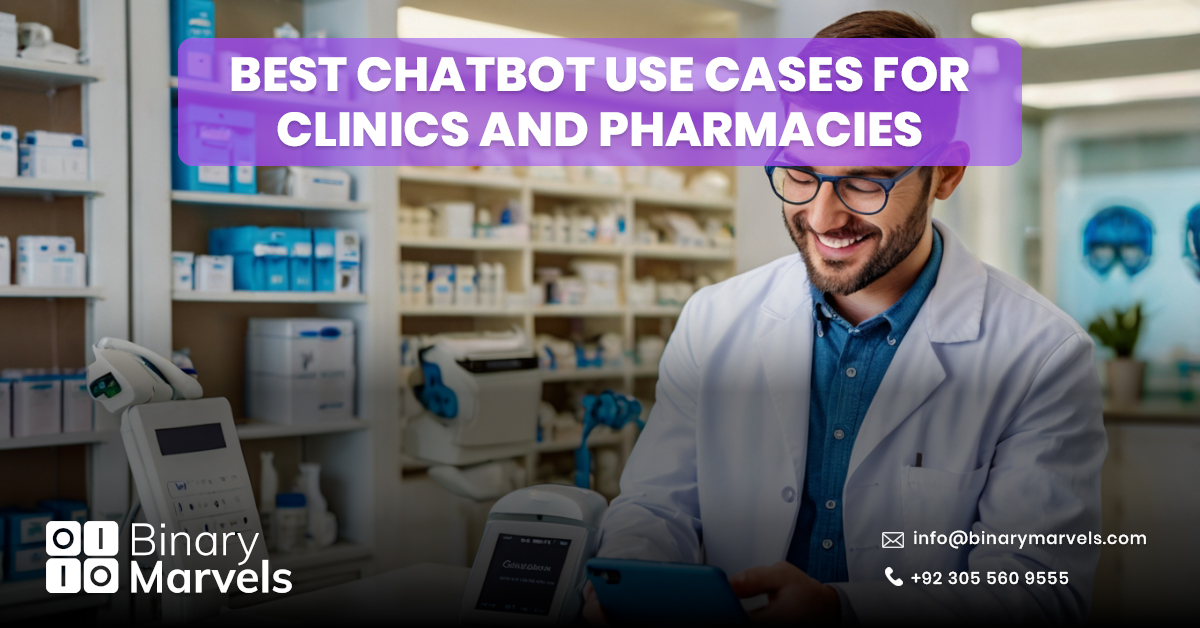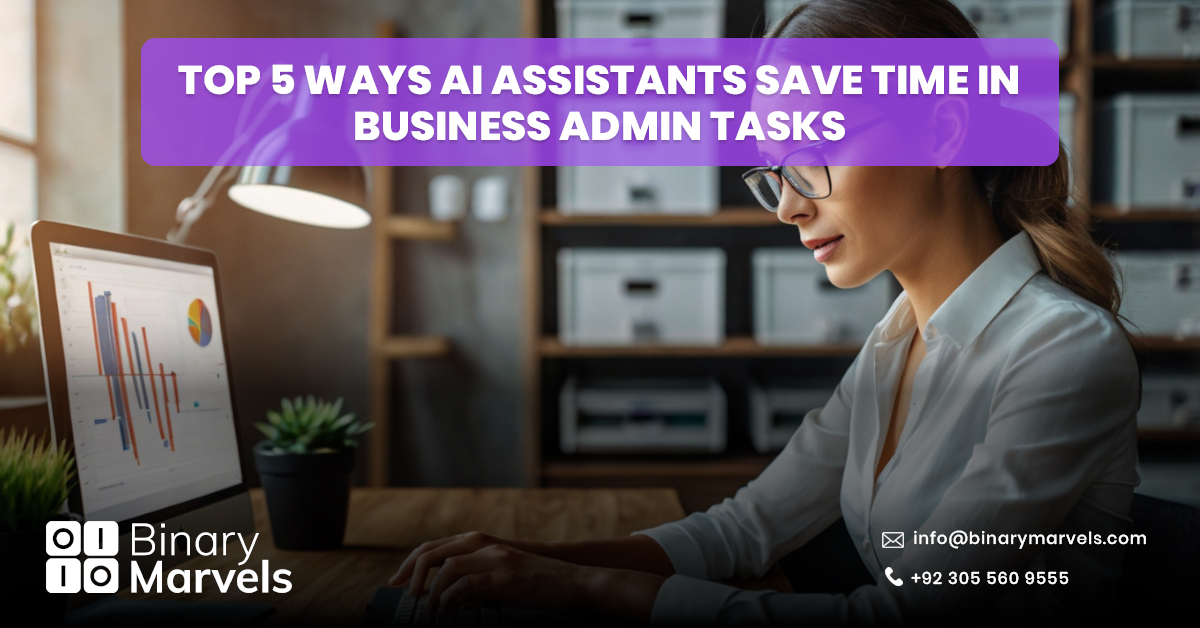
What if your clinic or pharmacy could offer 24/7 patient support, automate repetitive tasks, and improve patient satisfaction all without expanding your team? With healthcare chatbots, this is now a reality. Chatbots are becoming a game-changer for outpatient care, offering fast, intelligent, and personalized support for both patients and healthcare staff. From booking appointments to answering medication queries, AI-powered bots are revolutionizing how clinics and pharmacies operate.
In this guide, we’ll explore the most impactful chatbot use cases, their benefits, and how they’re shaping the future of healthcare.
Also Read: Top 10 AI Companies in Pakistan
Why Healthcare Chatbots Are Transforming Clinics and Pharmacies?
Modern healthcare demands efficiency, accuracy, and constant availability. Patients no longer want to wait on hold or visit in person for basic tasks like scheduling appointments or refilling prescriptions.
Clinics and pharmacies are adapting to these expectations by implementing chatbots that streamline communication and improve the overall patient experience.
Chatbots can assist with triaging symptoms, managing follow-ups, and answering common questions in real time. For healthcare providers, this means less administrative burden, faster service delivery, and a higher level of patient satisfaction.
Top Chatbot Use Cases in Clinics and Pharmacies
Healthcare chatbots are versatile tools that can handle a wide range of tasks in both clinical and pharmacy settings. They not only simplify day-to-day operations but also enhance patient engagement and streamline communication. Below are the most effective and widely adopted chatbot use cases that are transforming outpatient care across the globe.
1. Automated Appointment Scheduling and Reminders
One of the most common and impactful uses of chatbots in clinics is managing appointments. Patients can easily schedule, reschedule, or cancel their visits without calling the front desk. The chatbot can sync with the clinic’s calendar in real time, ensuring accurate availability and reducing double bookings.
Additionally, automated reminders sent via SMS, email, or messaging apps help reduce no-show rates and keep the schedule running smoothly. This not only saves time for administrative staff but also provides a more convenient experience for patients.
2. Prescription Refills and Medication Reminders
Pharmacy chatbots can significantly streamline the process of managing prescriptions. Patients can request prescription refills through a chatbot interface without needing to visit or call the pharmacy. The chatbot can verify eligibility, notify the pharmacy team, and alert the patient when the medication is ready for pickup or delivery.
Additionally, medication reminder features help patients stay on track with their dosage schedules. This improves adherence to treatment plans, reduces missed doses, and ultimately enhances patient health outcomes.
3. AI-Powered Symptom Checker and Pre-Triage
Chatbots equipped with symptom-checking capabilities can guide patients through a series of questions to assess their condition before they visit a clinic. By analyzing patient responses using AI, the chatbot can suggest whether the symptoms require urgent care, a scheduled visit, or home remedies.
This helps reduce unnecessary visits and eases the burden on medical staff. It also improves the patient journey by offering quick guidance and directing them to the right care at the right time.
Also Read: Top 10 Use Cases for AI Chatbots in 2025
4. Post-Visit Follow-Up and Recovery Monitoring
After a patient has visited the clinic or pharmacy, chatbots can play a key role in ongoing care. They can automatically check in with patients to monitor recovery progress, send reminders about medication or therapy, and gather feedback on the treatment experience.
If a patient reports concerning symptoms or complications, the chatbot can escalate the case to a human provider immediately. This level of proactive engagement helps improve recovery outcomes, enhances patient satisfaction, and ensures no one falls through the cracks after their initial visit.
5. Front Desk Automation and Patient Intake
Chatbots can efficiently handle front desk responsibilities by guiding patients through the intake process before they arrive. This includes collecting basic information such as name, contact details, symptoms, insurance data, and consent forms.
By digitizing these steps, clinics can reduce wait times, minimize paperwork, and ensure more accurate data entry. The chatbot can also answer common queries related to clinic policies, wait times, and directions, freeing up staff to focus on more complex tasks and in-person care.
6. Mental Health Screening and Support
Mental health chatbots offer a discreet and accessible way for individuals to begin addressing their emotional well-being. These bots can conduct preliminary screenings for conditions like anxiety, depression, and stress by asking guided questions based on clinical frameworks. They provide coping strategies, self-help resources, and encourage users to seek professional help when needed.
For clinics and pharmacies, this use case adds tremendous value by extending mental health support beyond traditional appointments, especially in underserved or remote areas where mental health resources may be limited.
7. Instant FAQs, Clinic Timings, and Pharmacy Information
Chatbots can instantly answer frequently asked questions related to clinic hours, available services, accepted insurance plans, and pharmacy stock availability. This saves patients from waiting on hold or searching the website and ensures they receive accurate, up-to-date information anytime.
Chatbots can also provide directions, holiday schedules, and even connect users to human staff when needed. By handling these routine inquiries efficiently, clinics and pharmacies can deliver faster service and reduce the administrative workload on their teams.
Also Read: The Ethics of Data Privacy and Security in AI Chatbots
Key Benefits of Chatbots in Clinics and Pharmacies
Integrating chatbots into clinical and pharmacy operations offers numerous advantages that directly impact patient care and staff productivity. One of the most significant benefits is 24/7 availability, allowing patients to get help or information at any time without waiting for business hours.
Chatbots also reduce the workload on front-desk staff by handling repetitive tasks like appointment bookings and answering FAQs. For pharmacies, they ensure timely medication refills and improve adherence through reminders.
Additionally, chatbots enhance patient engagement, reduce human error, and contribute to smoother, faster workflows while maintaining a consistent and professional tone in every interaction.
Challenges and Implementation Considerations
While chatbots offer significant advantages, their successful implementation in clinics and pharmacies requires careful planning. One of the main challenges is ensuring data privacy and regulatory compliance, especially when handling sensitive patient information. Compliance with HIPAA, GDPR, or local health data regulations is non-negotiable.
Another challenge is integration with existing systems such as electronic health records (EHRs), appointment management software, and pharmacy inventory tools. Without seamless integration, chatbots can create friction rather than solve problems. There’s also the issue of accuracy and reliability, as chatbots must be trained properly to provide correct medical guidance and know when to escalate to a human.
Additionally, staff may need training to work effectively alongside chatbot systems, and patients should be introduced gradually to build trust in automated support.
Also Read: Chatbot vs AI Chatbot: Key Differences and Benefits
Conclusion: The Future of Healthcare is Conversational
Chatbots are no longer just a tech trend; they are becoming essential tools in modern outpatient healthcare. For clinics and pharmacies, they offer a practical way to enhance service quality, reduce operational strain, and deliver 24/7 support without increasing staff.
From automating routine tasks to guiding patients through complex care journeys, chatbot technology is making healthcare more accessible, responsive, and patient-focused.
As AI continues to advance, the role of chatbots will only grow, enabling smarter, more connected, and more compassionate care. Now is the time for clinics and pharmacies to embrace conversational healthcare and stay ahead of patient expectations.
Supercharge Your Business with AI Today!
As a trusted AI Development Company in Pakistan, we deliver cutting-edge AI Development Services designed to streamline your operations and enhance customer engagement.
Don’t wait—connect with us now and take your business to the next level!
Frequently Asked Questions (FAQs)
Are chatbots safe for managing sensitive patient data?
Yes, healthcare chatbots can be safe as long as they comply with data protection regulations like HIPAA or GDPR. They must use secure encryption and follow best practices in data handling to protect patient confidentiality.
What are the main challenges of implementing chatbots in clinics?
Key challenges include ensuring data privacy, integrating with existing systems like EHRs, training staff to use the new technology, and maintaining chatbot accuracy for medical-related queries.
Can chatbots help with medication management in pharmacies?
Absolutely. Chatbots can assist patients with medication reminders, prescription refill requests, dosage guidance, and alerts for missed medications, improving overall adherence.
Which clinics or pharmacies are already using chatbots?
Many well-known providers like CVS, Walgreens, Babylon Health, and Ada Health are using chatbots. Smaller local clinics and pharmacies are also adopting chatbot solutions to manage appointments and support patient inquiries.
What is the future of chatbots in outpatient healthcare?
The future involves smarter, AI-driven bots that provide predictive insights, voice interaction, deeper integration with medical records, and more proactive patient care through real-time health monitoring.









